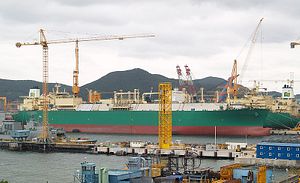Hyundai Heavy Industries’ (HHI) plan to acquire Daewoo Shipbuilding & Marine Engineering (DSME), which the South Korean shipbuilder views as a key survival card, has been able to overcome the first huddle. HHI shareholders on May 31 approved a plan to split up the company, which is the first step for the country’s largest shipbuilder to carry out its proposed merger with runner-up DSME.
The plan has been struggling due to strong opposition from HHI’s labor union. It was on the verge of collapse even before the journey of restructuring to save the Korean shipbuilding industry began.
As the first step in acquiring DSME, HHI had planned to hold a shareholders meeting to split the company into two entities, Korea Shipbuilding & Marine Engineering (KSME) and HHI. After that, the plan was to have KSME acquire DSME while HHI would oversee existing two sister firms, Hyundai Samho Heavy Industries and Hyundai Mipo Heavy Industries.
That plan met immediate backlash, mainly due to concerns over possible layoffs.
HHI has said on several occasions that there will be no restructuring, but the union still opposes the merger, citing concerns over lost jobs. In particular, members of the union pointed out HHI’s plan to locate KSME’s headquarters in Seoul, raising a fear that it would have a negative impact on employees based in the city of Ulsan, where the shipbuilder’s production facilities are.
HHI, however, refuted the union’s claims. About 500 workers will work at KSME, which will serve as an R&D control tower. That accounts for only 3 percent of HHI’s workforce of approximately 15,000 workers. Moreover, 450 R&D workers are already working at HHI’s Seoul office, HHI explained.
Many believe that the merger of the two companies is the only way that South Korea’s shipbuilding industry can survive amid rising competition, especially the challenge from Chinese players. After all, DSME has received more than 10 trillion South Korean won ($8.4 billion) in public funds over the past 20 years under the management of the state-run Korea Development Bank (KDB) but failed to make its business profitable.
With the planned merger, HHI and DSME will become one of the largest shipbuilders in the world, holding a global market share of over 21 percent. For this reason, the governments and industries of rival countries are already raising concerns over a monopoly. But ironically the bid also faces backlash domestically.
Apart from complaints from the union, there is another issue holding back HHI’s plan: A lack of interest from the South Korean government.
The KDB has played an important role in encouraging HHI’s plan to acquire DSME, but relevant government organizations have been passive about facilitating the process since the dispute between HHI and the union erupted.
The Ministry of Trade, Industry and Energy, for instance, recently said it is difficult to disclose any government position on corporate mergers and other relevant issues as international trade issues are at stake, but it promised to keep a close eye on the situation.
The Ministry of Employment and Labor likewise said it is better for the local government to deal with what happens in an individual company than for the minister to give direct instruction.
There are several more steps that HHI must take to finalize the merger, such as getting approval at home and abroad. KSME, the to-be-holding company of HHI and DSME, for instance, is required to apply for approval of the merger with foreign fair trade authorities, including the EU and the United States, as well as South Korea’s Fair Trade Commission. Already, there are worried voices in the EU saying that there is a possibility of market oligopoly after the merger.
The screening process could become more difficult in the future if the establishment of the merged entity is delayed amid backlash at home, and conflicts with the labor union continue.
One of the vows made by South Korean President Moon Jae-in, not long after his inauguration, was to revive and further nurture the country’s shipbuilding industry. This is the perfect time for Moon and his government to take action to honor his pledge.

































